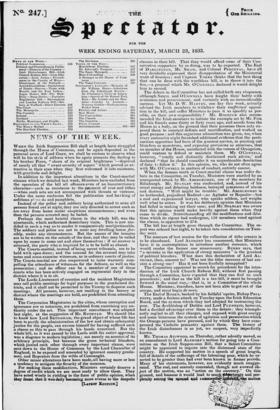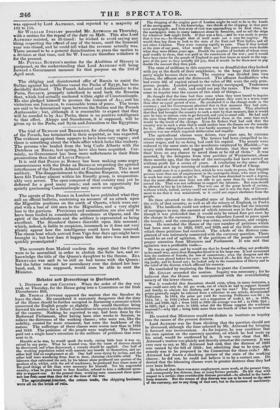NEWS OF THE WEEK.
WHEN the Irish Suppression Bill shall at length have struggled through the House of Commons, and be again deposited in the paternal arms of Lord GREY, we shall be curious to observe what will be his style of address when he again presents the darling to his brother Peers, "shorn of its original brightness "—deprived of nearly all that "sweet severity of aspect" which proved so at- tractive in their eyes when they first welcomed it into existence, with gratitude and delight. In addition to the important alterations in the Court-martial clauses which we detailed last week, Ministers have excluded from the operation of the bill all offence k even of an insurrectionary character—such as resistance to the payment of rent and tithes —when such acts are not accompanied with threats or violence. Under the same exclusion fall the publication and hawking af seditious pli,ealds and pamphlets.
• Instead of the police and soldiery being authorized to seize all persons found out at night, they are only directed to arrest such as • are away from home under suspicious circumstances; and even then the persons arrested may be bailed.
Perhaps the most hateful clause in the whole bill, was the nineteenth, which authorized domiciliary visits. This is now Mo- dified in such a way as to render it comparatively unobjectionable. The soldiery and police are not to enter any dwelling, house for- cibly, under any circumstances. But the names of the inmates are to be written on the outside of the door, and they may be called upon by name to .come out and show themselves : if no answer is returned, the party who is inquired for is to be held as absent. The Courts-martial, instead of being secret tribunals, are to be held with open doors; and the counsel for the accused may take notes and cross-examine witnesses, as in ordinary courts of justice. The Courts-martial are also empowered to issue warrants com- pelling the attendance of witnesses for the defence, as well as the prosecution: and no officer can be a member of one of these courts who has been actively engaged on regimental duty in the
• district where it is to sit.
The Lords-Lieutenant of counties and the resident Magistrates may call public• meetings for legal purposes in the proclaimed dis- tricts, and it shall not be permitted to the Viceroy to disperse such meetings. All persons, however, not residing in the barony or district where the meetings are held, are prohibited from attending them.
The Corporation Magistrates in the cities, whose corruption and ignorance are so notorious, are prohibited from exercising any au- thority under the act. This important amendment was adopted last night, at the suggestion of Mr. RUTHVEN. We should like to know how Lord BROUGHAM, the grand object of whose life has been to purify the administration of the law and obtain substantial • justice for the people, can excuse himself for having suffered such a clause as this to pass through his hands unnoticed. But the whole bill, as it was passed by the Lords with his entire approval, was a disgrace to modern legislation ; not merely on account of its arbitrary principle, but because the gross technical blunders, • which jostled each other through every important clause, were sent down to the House of Commons by the Lord Chancellor of England, to be exposed and amended by ignorant country gentle- men, and Repealers from the wilds of Connaught. Other minor alterations have been made, all having more or less a tendency to mitigate the ferocity of the measure. For making these modifications, Ministers certainly deserve a Aegree of credit which we are most ready; to allow them. They have acted wisely in yielding to the force of public opinion, when they fount that it was daily becoming more averse to the despotic
(WM EDITION.]
clauses in their bill. That they would offend some of their Con- servative supporters by so doing, was to be expected. The Earl of DARLINGTON, Mr. SHAW, and Colonel PERCEVAL, have all very decidedly expressed their disapprobation of the Ministerial want of firmness ; and Captain YORKE thinks that the best thing that can be done with the worthless bill, is to throw it into the fire,—a proposal which Mr. O'CONNELL declared it would delight him to second.
The debate in the Committee has not called forth any eloquence, although SHEIL and O'CONNELL have fought their battle with acuteness and perseverance, and certainly with no inconsiderable success. Yet Mr. D. W. HARVEY, one day this week, actually advised the Irish members to withdraw their ineffectual opposi- tion to the bill, and suffer Ministers to pass it as speedily as pos- sible, on their own responsibility ! Mr. ROEBUCK also recom- mended the Irish members to imitate the example set by Mr. Fox and his friends some thirty or forty years ago, and secede front the House in a body, on the ground that their presence there only ex- posed them to constant defeats and mortification, and worked no good purpose : and this sagacious admonition was given, too, when every successive night furnished additional evidence that the perti- nacious opposition had been of the greatest service, in pointing out blunders so monstrous, and exposing provisions so atrocious, that no member of the House, uninfected with the venom of Orangeism, could venture to defend or maintain them. Mr. O'CONNELL, however, " totally and distinctly disclaimed such advice,' and declared "that he should consider it an unpardonable dereliction of duty to follow it." In this opinion, we, who do not often agree with Mr. O'CONNELL in matters of conduct, entirely concur.
When the famous tenth or Court-martial clause was under de- bate in the Committee, on Tuesday, Ministers were startled by an unexpected attack by Mr. ABERCROMBY, one of the members for Edinburgh. Mr. STANLEY Was confounded, and, instead of his usual energy and debating boldness, betrayed symptoms of alarm and distress. "Well might he tremble. Mr. ABERCROMBY is no hotheaded, prejudiced Radical—no Agitator or Repealer—but a cool and experienced lawyer, who speaks seldom, and weighs well what he utters. It was his deliberate opinion that Ministers had failed in making out their case; and Mr. STANLEY was aware that this opinion would make heavily against them when they came to divide. Notwithstanding all the modifications and dilu- tions which its rigour had undergone, 130 members voted-against the clause, in opposition to 270. The bill has at length gone through the Committee. The re- port was ordered last night, to be taken into consideration on Tues- day next. The measure of last session for the collection of tithe arrears is to be abandoned. Lord ALTHORP has announced, that Ministers have it in contemplation to introduce another measure, which would render the former one unnecessary. &num says, that "a mistake in the application of strong measures" is the greatest of political blunders. What does this declaration of Lord Ax.- Twine, then, amount to? Was not the tithe measure of last ses- sion a strong one? Has it not been fearfully misapplied? The Committee appointed to search for precedents for the intro- duction of the Irish Church 'Reform Bill, without first passing through aCommittee, have rspotted that they can find no such precedents ;* and that as the bill is a tax-bill, it must be brought forward lit the usual way,—that .is, in a Committee of the whole House. Ministers, therefore, have IDA been able to get out of the scrape, and must begin de novo. The Earl of RonaN, backed 14 his faithful 'squire, Bishop PHIL- POWS, made a furious attack on Tuesday upon the Irish Education Board, and the system which they had adopted for instructing the poor. The Archbishop of Dublin and Lord PLUNKETT, however, bad a decided advantage over them in the debate : they triumph- antly replied to all their charges, and exposed with great energy and some bitterness the system of agitation and persecution which the Orange parsons have . pursued, and by which they have exas- perated the Catholic peasantry against them. The history of the Irish disturbances is as yet, we suspect, very imperfectly known.
Mr. THOMAS ATrwoon, on Thursday, rather adroitly moved, as an amendment to Lard ALTHORP'S motion for going into a Com- mittee on the Irish Suppression Bill, that a Select Committee might be appointed to inquire into the distressed state of the country. He supported his motion in a speech of great length, full of details of the sufferings of the labouring poor, which he as- serted to be greater than had ever been known in former periods. Many of his statements, however, are evidently much exagge- rated. The real, and scarcely concealed, though not avowed ob- ject of the motion, was an "action. on the currency." On this ground, and because it would lead to much 4Aaipty and per- p1eiLy thg TI3014igd nud CQ2 meI motion
was opposed by Lord ALTHORP, and rejected by a majority of 192 to 158.
Sir WILLIAM INGILBY preceded Mr. Arrwoon on Thursday, with a motion for the repeal of the duty on Malt. This also Lord ALTHORP resisted, as ill-timed : he wished to avoid saying any thing respecting the rcopeal of any of the taxes, until the financial year was closed, and he could tell what the revenue actually was. There seemed to be a general disinclination to press the motion to a division at that time, and Sir W. INGILBY therefore withdrew it for the present. Mr. FOWELL BUXTON'S motion for the Abolition of Slavery is postponed, on the understanding that Lord ALTHORP will bring forward a Government measure for that purpose on the 23d of April next.





















 Previous page
Previous page